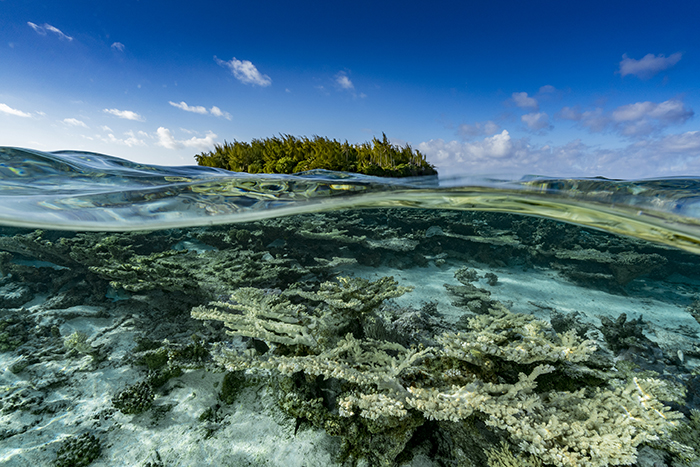Interviews / Ocean
12 January 2021
One Planet Summit: An Unprecedented Mobilisation Around Marine Issues, With What Impact?

Marine issues have long struggled to find a place in international relations, despite their vital importance to humanity. However, an increasing number of initiatives on this topic are emerging, such as the One Planet Summit on 11 January, which focused extensively on it. An interview with Julia Tasse, researcher at IRIS and head of the Climate, Energy and Security Programme.
The issue of maritime challenges seems to be increasingly prominent on the international stage. What are the stakes ?
Maritime issues are indeed becoming increasingly prominent in climate and biodiversity negotiations, as well as within broader platforms such as the UN and the WTO. This reflects a growing awareness of the vital land-sea connections and the interactions between human activities, ocean health, and the natural resources we use daily. The ocean, as a unique reservoir of biodiversity and a key component of the climate system (whose mechanisms are not yet fully understood), is being increasingly discussed in environmental negotiation forums.
Furthermore, terrestrial territories are now almost entirely occupied by humans, while the marine realm remains one of the few areas that is still partially unexplored and difficult to access. Appetite for marine resources is growing, with many governmental and economic actors seeking to exploit them. This race for technologies that enable access to certain zones or make resource extraction more efficient further underscores the increasing importance of maritime issues. States are thus showing greater interest in the opportunities offered by marine spaces, whether in terms of military, strategic, or economic power. This, in turn, poses a growing threat to marine ecosystems and highlights the need to protect certain areas.
The One Planet Summit has decided to focus on the issue of oceans this year. What impact could it have on maritime challenges?
The One Planet Summit is an almost annual event initiated by France, aimed at delivering messages related to the fight against climate change. This year, it focused particularly on biodiversity, including marine biodiversity (of which only 9% is believed to be known, with 91% yet to be discovered). Among the key topics of the January 11 Summit was the protection and conservation of biodiversity. Since 2019, France and Costa Rica have led the High Ambition Coalition for Nature. This initiative now brings together around fifty states and aims to protect 30% of natural areas by 2030, including marine areas.
The One Planet Summit chose to place biodiversity at the heart of climate-related discussions because the two are closely linked: climate change impacts biodiversity, while many biological species are essential for maintaining the balance of the carbon and water cycles. The year 2021 is considered a pivotal moment: on the one hand, many biodiversity and climate goals (such as the SDGs and the Aichi Targets) had a 2020 deadline, and their progress will now be evaluated; on the other hand, the Conferences of the Parties (COPs) under UN climate and biodiversity conventions will play a crucial role in strengthening and setting new objectives. For example, COP15 on biodiversity, scheduled for October in Kunming, China, is expected to address the target of protecting 30% of natural areas by 2030. Similarly, COP26 on climate will be a key milestone following COP21, as countries are expected to announce new greenhouse gas emission reduction targets. Many, including China, Japan, the EU, and South Korea, have already set goals of carbon neutrality by 2050 or 2060.
The One Planet Summit has, in a way, launched a year full of promise, giving an initial momentum that, I hope, will lead to significant progress.
What is the current state of initiatives on ocean issues? Are the signing of treaties or the establishment of ministries dedicated exclusively to the sea, like the French initiative, becoming more widespread?
The issue of oceans is increasingly influencing various negotiations, which is very positive, as it makes no sense to talk about climate or biodiversity without addressing the ocean. Specific discussions are also ongoing: the status of biodiversity in international waters, through UN negotiations called BBNJ (Biodiversity Beyond National Jurisdictions), and subsidies for the fishing industry (a topic addressed by the WTO). The ocean is a constantly shifting space that connects different continents. As such, treaties and international agreements are essential. The dynamic of agreements for the protection and sustainable management of marine resources is therefore key. This maritime cross-cutting approach is also what led to the establishment of the Ministry of the Sea. Managing such a diverse space, with such varied stakeholders and difficult-to-monitor boundaries, requires strong interministerial cooperation, and in my view, the Ministry of the Sea is an indispensable coordinator. Many countries had already “equipped” themselves with a Ministry of the Sea. This is the case for Portugal, a major maritime nation as well. While establishing Ministries of the Sea in other countries may not be essential for the sustainable joint management of marine areas, it would certainly be beneficial, as it would ensure that both sides of borders understand the interconnections between people and the sea. This would prevent the fragmentation of information, which hampers a global understanding of the ocean.

